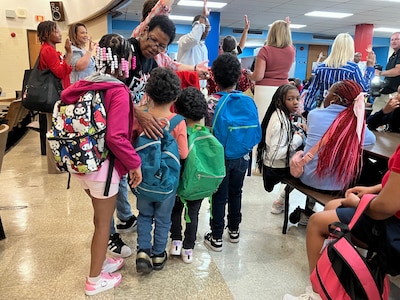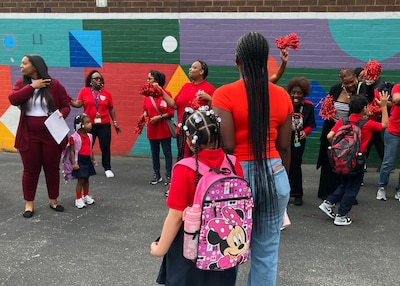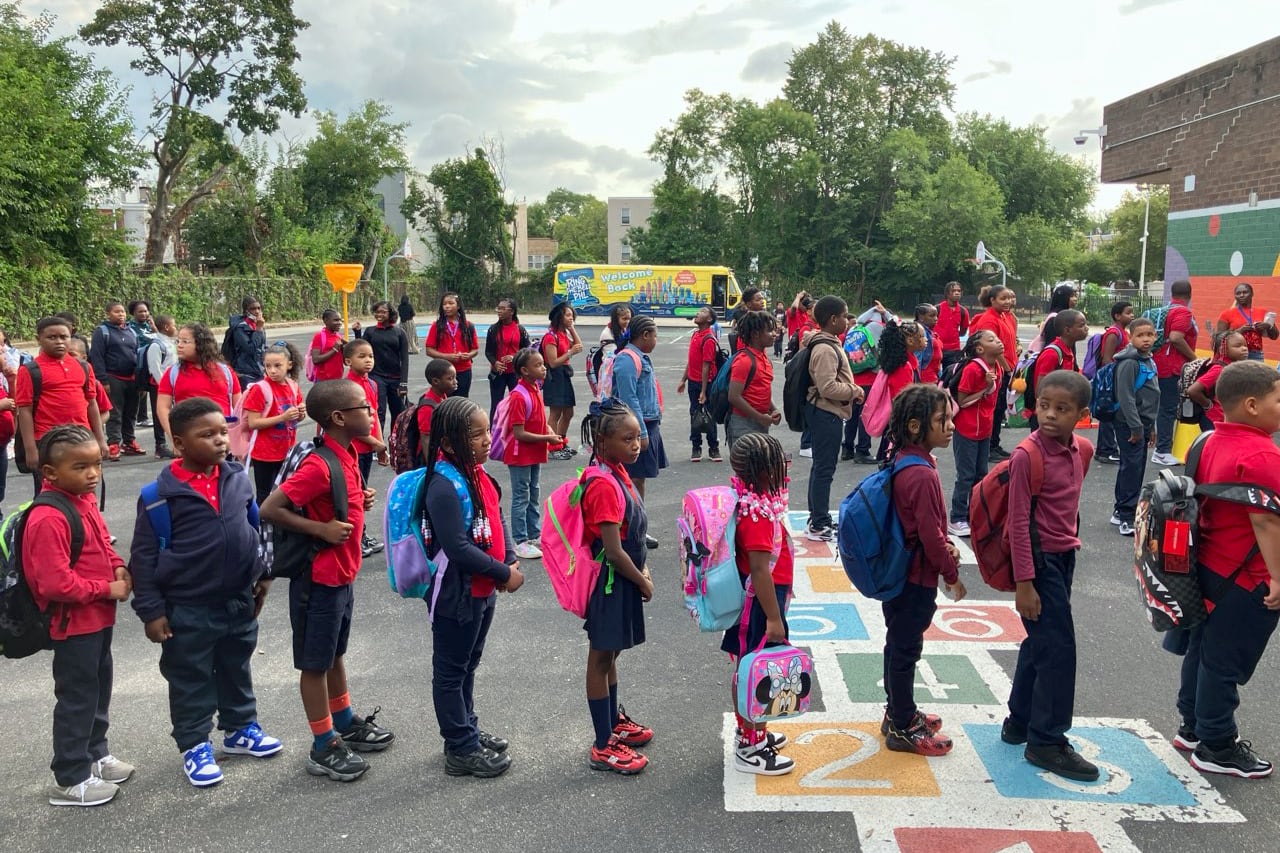Sign up for Chalkbeat Philadelphia’s free newsletter to keep up with news on the city’s public school system.
Nearly 118,000 Philadelphia students headed back to classrooms on Monday. Some celebrated birthdays. Others were thankful for the relatively cool weather. And more than a few wished summer could’ve lasted just a bit longer.
With a new tentative teachers union contract agreement under their belts and the threat of a strike all but forgotten, Superintendent Tony Watlington, Mayor Cherelle Parker, Board of Education President Reginald Streater and other elected officials greeted arriving students at Edward Steel Elementary School in Nicetown with cheers and metallic red pompoms.
“This is a school year where we have wind underneath our wings, even though we have a lot of challenges in front of us,” Watlington said Monday.
Indeed, the district is staring down a multi-million dollar budget deficit worsened by a lingering state budget impasse that’s likely to delay crucial payments to Pennsylvania districts. That delay has also caused public transit cuts that are already disrupting students’ rides to and from school. And the district’s ongoing facilities planning process will come to a head this fall when officials are expected to release their plan for school closures and renovations.
Despite the challenges, school leaders opened their doors on Monday with optimistic messages.

Steel Elementary Principal Angikindslows Senatus said this year, he’s leaning into his school’s three core principles: “safety first, respect always, and striving for achievement.”
“We want to make sure that regardless of the challenges and the issues that we face, that we make sure that we cross the boundary and meet each other,” Senatus said.
Here are three things we’ll be watching this school year.
Philadelphia school closures are likely
District officials have said the structure of the city’s public school system needs to fundamentally change. That means school closures are likely coming.
As enrollment demographics shift, some schools have become overcrowded, forcing students to learn in hallways and trailers, while other buildings are more than half empty and are costly to maintain. Some schools have temperature-controlled spaces and proper equipment for gym class, career and technical education programs, and prekindergarten. Others have been repeatedly closed for asbestos remediation and inadequate heating and cooling.
As a result, district officials have been drafting a plan to close, repurpose, colocate, and remodel each of its more than 300 buildings. That plan is expected to be presented to the Board of Education in November.
Painful SEPTA cuts could impact student attendance
In the absence of a state budget deal, SEPTA has moved forward with massive cuts, service reductions, and fare increases, including the elimination of some 400-series bus lines, which specifically serve schools at the beginning and end of the school day.
Educators, parents, and advocates told Chalkbeat they’re worried the transit changes will mean students will have a harder time getting to school and participating in internships and extracurricular activities.
The SEPTA cuts are adding “chaos” to the school year, said Sean Vereen, president and CEO of Heights Philadelphia, which connects Black, Latino, and first-generation college students from low-income communities with workforce and college attainment programs.
“There are already too many barriers to young people accessing their opportunities, and this seems to be another place where we’re putting up barriers that we don’t need to,” Vereen said. “Young people require stability and investment, and all these things send the opposite message.”
Watlington has emphasized increasing student attendance rates during his time in office. He said last week that no students will be penalized if they’re late because of transit issues, but it remains to be seen how the cuts will affect district attendance rates.

School choice programs continue to dominate the conversation
The perennial push for new voucher-like school choice programs and funding are among the issues at the root of Pennsylvania lawmakers’ budget stalemate.
Emboldened by the new national federal tax-credit scholarship program, Pennsylvania Republicans are resurrecting a plan to allow families to use state money to pay some private school tuition and other education costs. While Democratic Gov. Josh Shapiro supported a prior voucher proposal, he subsequently backed down and vetoed such a proposal in 2023.
Meanwhile, Democrat legislators have said increasing funding for public school districts is not only their budget priority, but also constitutionally mandated.
At the same time, Philadelphia school officials are trying to balance growing demand for traditional and cyber charter schools with their desire to boost enrollment at neighborhood public schools. The Philadelphia Board of Education voted last May to approve the city’s first new charter school in nearly a decade, but members last week also voted to move forward with the nonrenewal process for two underperforming charters.
While the leaders of one charter school have already said it will close next year, those in charge of another, Memphis Street Academy, have vowed to continue fighting a judge’s closure order.
Carly Sitrin is the bureau chief for Chalkbeat Philadelphia. Contact Carly at csitrin@chalkbeat.org.






